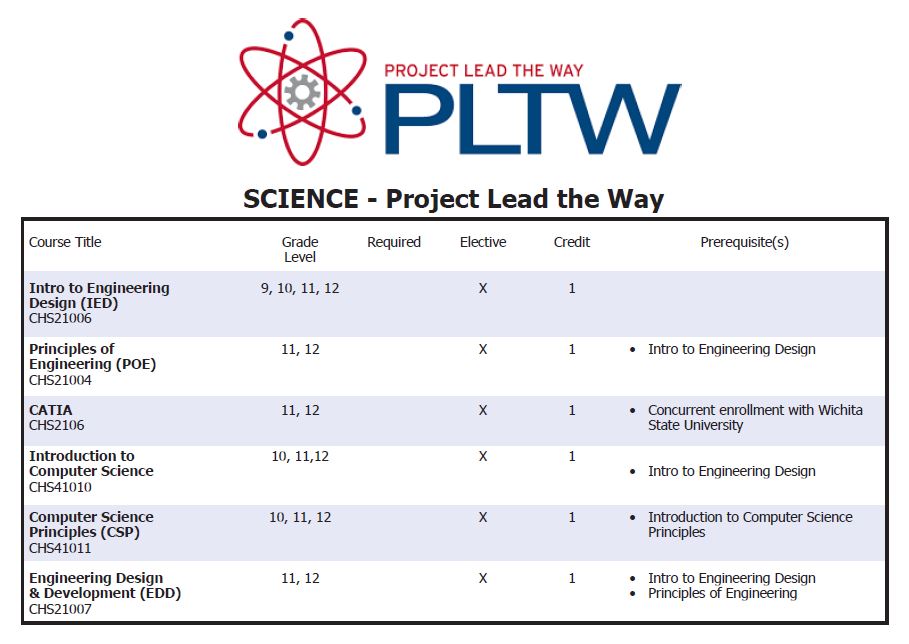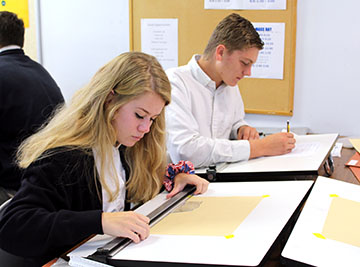Project Lead the Way (WSU)

PLTW Engineering is a program applying engineering, science, math and technology to solve complex, open-ended problems in a real-world context. Students focus on the process of defining and solving a problem, not on getting the “right” answer. They learn how to apply STEM knowledge, skills and habits to make the world a better place through innovation.
Foundation Courses:
INTRODUCTION TO ENGINEERING DESIGN (IED) (CHS21006)*
Students dig deep into the engineering design process, applying math, science and engineering standards to hands-on projects. They work both individually and in teams to design solutions to a variety of problems using 3D modeling software, and document their work in an engineering notebook.
PRINCIPLES OF ENGINEERING (POE) (CHS21004)*
Application of the Introduction to Engineering Design class is reinforced through both individual and group projects by introducing students to the principles and theories of basic engineering applications. Explorations include how simple machines affect work and energy; the impact of statics, material properties, thermodynamics, and fluid properties on simple design ideas; an introduction to simple machine coding; and properties of simple motion.
Capstone Course:
ENGINEERING DESIGN AND DEVELOPMENT (EDD) (CHS21007)*
The knowledge and skills students acquire come together in EDD as they identify an issue and then research, design and test a solution ultimately presenting their solution to a panel of engineers. Students apply the professional skills they have developed to document a design process to standards completing EDD ready to take on any post-secondary program or career.

Specialized Courses:
CATIA (CHS2106)
This course is an interdisciplinary curriculum that prepares graduates for a variety of positions in manufacturing design. All students complete a core set of courses selected to provide a well-rounded understanding of design. This program also allows students to select a focus for their design studies from two different tracks — Mechanical Design or Mechanical Engineering Design. Topics include hands-on instruction in current technical competency areas including Computer Aided Drafting (CAD), Machine and Tool Design, Computer Numerical Control (CNC), Electrical Design, 3–D Solid Modeling, CATIA and ENOVIA LCA. CATIA and ENOVIA courses are taught in conjunction with the National Institute of Aviation Research (NIAR).
INTRODUCTION TO COMPUTER SCIENCE (CHS41010)
This Technology Education and Literacy in Schools (TEALS) course curriculum is based on the award-winning University of California at Berkeley CS 10 course, “Beauty and Joy of Computing” (BJC). It is an engaging course that explores a variety of basic computational thinking and programming concepts through a project-based learning environment. Every unit of content culminates in a comprehensive project and roughly 75% of student time is spent building projects and practicing the skills they are learning.
COMPUTER SCIENCE PRINCIPLES (CSP) (CHS41011)
Using Python® as a primary tool and incorporating multiple platforms and languages for computation, this course aims to develop computational thinking, generate excitement about career paths that utilize computing, and introduce professional tools that foster creativity and collaboration. Computer Science Principles helps students develop programming expertise and explore the workings of the Internet. Projects and problems include app development, visualization of data, cybersecurity and simulation.
*Denotes classes that are required to receive the PLTW and college credit towards an engineering degree at PLTW universities:
Arkansas Tech University
Auburn University
Bucknell University
California State Polytechnic University
California State University-Bakersfield
California State University, East Bay
Duke University
Eastern Michigan University (EMU)
Embry-Riddle Aeronautical University (Daytona Beach)
Florida Gulf Coast University
Georgia Southern University
Indiana University-Purdue University Indianapolis(IUPUI)
Iowa State University (ISU)
Lawrence Technological University
Milwaukee School of Engineering (MSOE)
Minnesota State University Mankato
Mississippi State University
Missouri University of Science and Technology
New Mexico State University
NHTI Concord’s Community College
North Dakota State University
Northwestern State University of Louisiana
Oklahoma State University
Old Dominion University (ODU)
Oregon Institute of Technology (OIT)
Purdue University
Rochester Institute of Technology (RIT)
Rose-Hulman Institute of Technology
Rowan University
San Diego State University (SDSU)
San Jose State University
Sanford Research (USD)
Seattle University
Sinclair Community College
St. Cloud State University
Stevenson University
The University of Kansas
The University of Montana
University of Colorado at Colorado Springs (UCCS)
University of Illinois-Chicago
University of Illinois-Urbana Champaign
University of Iowa
University of Kentucky
University of Maryland-Baltimore County
University of Minnesota
University of Nebraska-Lincoln
University of Nevada Las Vegas (UNLV)
University of New Haven
University of Oklahoma Health Science Center (OUHSC)
University of South Carolina
University of Tennessee Chattanooga (UTC)
University of Texas at Tyler
Washington State University, Spokane
Weber State University
West Virginia University
Wichita State University
Worcester Polytechnic Institute (WPI)
